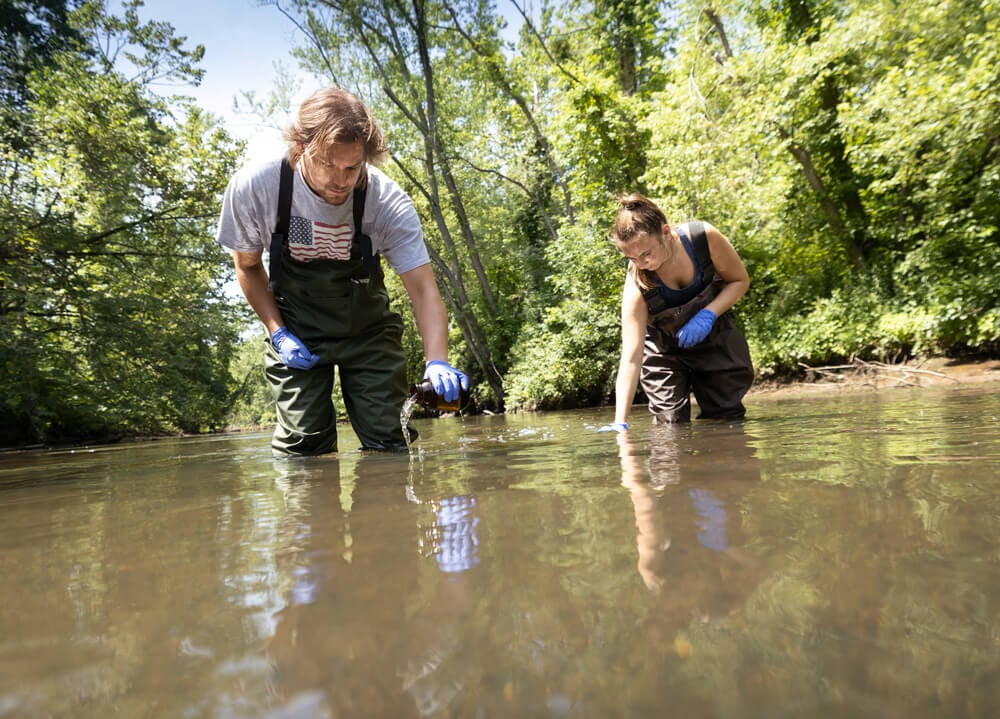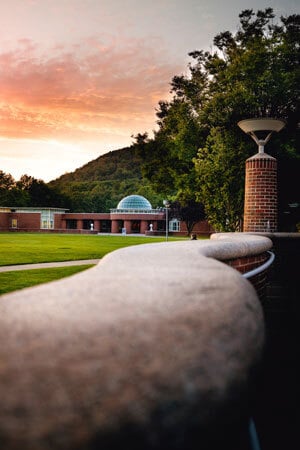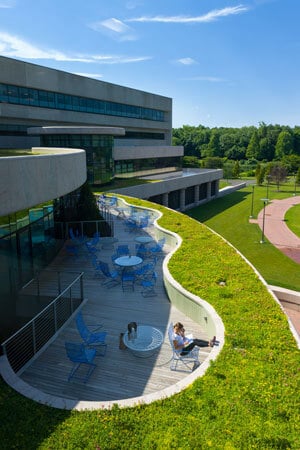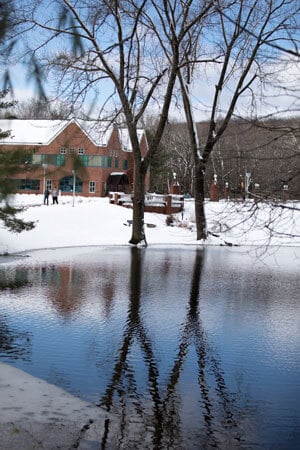$78K Well Compensated
The median annual salary for environmental scientists and geoscientists is $78,730. (U.S Bureau of Labor Statistics, 2023)


Areas of Interest

Areas of Interest
Are you committed to protecting the environment? Do you want to use your talents to create a more sustainable future and a healthier planet? Channel your passion into a career in environmental studies where you can explore the interconnectedness of the world, help conserve resources and improve our global health. With an interactive and experiential-based curriculum, our environmental programs will provide a solid foundation for continued exploration in graduate studies or a successful career focused on protecting our world’s natural resources.
As the world addresses issues such as climate change and global expansion, there is an increased demand for conscientious stewards to protect both our natural and designed environments. New regulations implemented at an increasingly rapid rate are creating more jobs each day to tackle the complex issues caused by human activity. Whether your interests are recycling, conservation, reducing industrial contamination or investigating the health risks of pollution, there are a wide range of professional options to fit your interests.
Our undergraduate and dual-degree programs will provide the insight and hands-on experience to gain a deeper understanding of some of the most prevalent environmental issues facing us today. You will examine topics from various perspectives, including political, sociological, legal, economic and cultural. Our academic programs include an emphasis on experiential learning with practicums, fieldwork, internships, global learning and interdisciplinary projects led by faculty experts.
With a variety of student organizations, including academic and service groups, you’ll have many opportunities to connect with people who share your talents and interests. Joining a student organization is an ideal way to boost your skills, get involved, network — and have some fun, too.
Alpha Phi Omega
The Big Event at Quinnipiac
Bobcats in the Community
Community Action Project (CAP)
Habitat for Humanity
Hand Prints for Sunshine
Quinnipiac University American Society of Civil Engineers (ASCE)
Relay For Life
Rotaract Club
Society of Women Engineers (SWE)
Students for Environmental Action
We envision a world where Quinnipiac students, faculty, staff and alumni are agents of sustainability for the communities they engage and enrich — locally and beyond. To accomplish this, QU promotes a culture where students gain and develop an understanding of environmental sustainability appropriate to their majors. Students learn about complex connections among natural environments, built infrastructure, and social and cultural institutions. Learning occurs within the curriculum and through engagement in co- and extra-curricular activities.
We are currently proceeding on three fronts:
Conducting audits of:
Our faculty members’ expertise related to sustainability
Current environmental initiatives
Campus culture
Curriculum
Building curricular and co-curricular elements, by:
Implementing our three new majors
Developing new courses for the University Curriculum
Establishing an eco-rep program
Setting targets to:
Establish an environmental Essential Learning Outcome (ELO)
Integrate sustainability as a theme throughout all co- and extra-curricular programs and activities


In both physical presence and action, Quinnipiac serves as a responsible steward of its natural resources and supports the long-term environmental sustainability of humanity on Earth. QU community members live and engage in sustainable practices, contributing to the creation of a more resilient and environmentally sustainable campus and community.
We currently work to:
Measure:
Waste and energy flows
Water consumption
Transportation options
The use of plastic on campus
Implement:
Recycling education
Food recovery programs
Increased access to existing campus and regional transit services
Water conservation in our landscaping efforts
Programs promoting mindful conservation practices
Envision:
Targeted reductions of single-use plastics
Alternatives to single-occupancy vehicles
A flagship sustainable facility on campus


The presence of environmental sustainability in all pertinent practices is a central value at Quinnipiac. This value permeates our administrative and operational structures and provides the basis for external communication and internal execution of sustainable practices.
To better lead in sustainability on and off campus, we are:
Hiring an in-house environmental health and safety officer
Researching appropriate institutional memberships
Developing and implementing comprehensive monitoring and reporting systems
Working toward the full establishment of an Office of Sustainability with a Chief Sustainability Officer


We envision a Quinnipiac that is a model for sustainability in southern New England, building its practices and leveraging its campuses to promote a healthy regional ecosystem, and to engage in practices that equip current and future students, faculty and staff to embody sustainable practices in their personal and professional lives, equipping them to thrive in a world increasingly influenced and affected by environmental disruption.
The Albert Schweitzer Institute conducts programs that link education, ethics and voluntarism for the sake of creating a more peaceful and sustainable world. A dynamic presence at Quinnipiac, the institute has drawn notable humanitarians both to campus and to its board, and gives students of all majors opportunities to make a positive impact on local and global communities.
Programs
Showing 0 Programs
BS
On Campus
BS
On Campus
BS
On Campus
BS
On Campus
BS
On Campus
BS
On Campus
BA (Co-Major)
On Campus
BA
On Campus
We've sorted each of our undergraduate, graduate and doctoral programs into 16 unique Areas of Interest. Explore these categories to discover which programs and delivery methods best align with your educational and career goals. As you browse each program, you will learn more about what to expect as a student here at Quinnipiac — from our state-of-the-art facilities and workspaces to the career development and academic advising resources at your disposal.
Our graduate and undergraduate admissions representatives are here to answer any questions you may have and help you navigate the application process.
Quinnipiac follows NACE First-Destination Survey Standards and Protocols for the collection and dissemination of undergraduate student initial career outcome information six months after graduation. Learn more about the standards for statistics and reporting used by Quinnipiac.